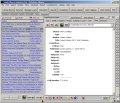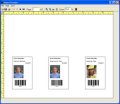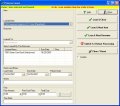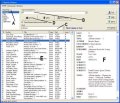The Library of Congress is soliciting help in a survey of
bibliographic and cataloging products. The survey is to determine the
value and use of the products. LC will “use the study to guide its
response to this changing cataloging environment, towards effectively
defining its future role, adapting a sustainable financial model, and
better serving its audience in the coming years,” according to an LC
statement.
This survey is directed at managers of cataloging and technical
services units, catalogers, and vendors and distributors of
bibliographic data and tools. The survey is available at www.digisurvey.com (username catalog, password survey) and will close after April 12, 2012.
Sharing Information, Technology Skills & Tips to every Librarians and Library Professionals...Additionally, we hope to offer valuable information about career opportunities and more in this field.
Showing posts with label Library Technology. Show all posts
Showing posts with label Library Technology. Show all posts
Wednesday, March 28, 2012
Libraries Are Colleges’ Most Effective Tech Investment, Surveys Find
Two surveys conducted by Inside Higher Ed found that college
and university chief academic officers/provosts and presidents alike
consider library technology to be their most effective technological
investment.
The 2011-12 Inside Higher Ed Survey of College and University Chief Academic Officers
found that, on average, CAOs/provosts rated their institutions’
investment in library technology as 58.8 percent effective, a higher
percentage than they gave to any other technology investment. Within
that overall score, for-profit institutions were the most satisfied,
with a ranking of 77.4 percent, followed by private doctoral programs at
64.9 percent. Private associates programs were the most dissatisfied at 42.9 percent, followed by private baccalaureate programs at 50 percent.
In Presidential Perspectives
on the Effectiveness of Campus Investments in Information Technology,
presidents were harder on library tech than provosts, rating its
effectiveness at 51 percent. But that lower number still made library
resources and services the only category
that a majority of all presidents rated as very effective. Library
resources was the top category chosen overall as well specifically by
private and for-profit institutions. Interestingly, public colleges and
universities ranked library tech third, behind online distance education
and on campus instructional technologies, even though they scored it
higher numerically – at 53.1 percent compared to only 46.9 percent for
private institutions. Public baccalaureate programs
were the most satisfied with their library technology effectiveness at
60.8 percent; public masters programs were least satisfied at 45.2
percent.
Tuesday, January 24, 2012
Dewey (Free) From Android Library Market
Saturday, January 7, 2012
OCLC Releases FAST as Linked Data
OCLC has released FAST (Faceted Application of Subject Terminology) as Linked Data.
FAST (Faceted Application of Subject Terminology), an enumerative, faceted subject heading schema derived from the Library of Congress Subject Headings (LCSH), is now available as an experimental Linked Data service (http://id.worldcat.org/fast/) and is made available under the Open Data Commons Attribution License.
The FAST authority file, which underlies the FAST Linked Data release, has been created through a multi-year collaboration of OCLC Research and the Library of Congress. Specifically, it is designed to make the rich LCSH vocabulary available as a post-coordinate system in a Web environment.
"Linked Data" is an approach to publishing data on the Web which enhances its utility by making references to persons, places, things, etc. more consistent and linkable across domains.
The release of FAST as Linked Data provides FAST headings that support both human and machine access. FAST incorporates links to corresponding LCSH authorities. In addition, many of the geographic headings have links to the GeoNames geographic database (http://www.geonames.org/).
Another Open Source Integrated Library Software
Project Next-L, the librarian community in Japan has announced the release of the open-source integrated library system, Next-L Enju Leaf 1.0.0.
Next-L Enju Leaf is a full-featured ILS built on Ruby on Rails 3.1, Apache Solr and their RESTful architecture. A live demo site is available.
Next-L Enju has been adopted by some libraries in Japan, for example, National Diet Library and National Institute for Materials Science.
Next-L Enju Leaf is a full-featured ILS built on Ruby on Rails 3.1, Apache Solr and their RESTful architecture. A live demo site is available.
Next-L Enju has been adopted by some libraries in Japan, for example, National Diet Library and National Institute for Materials Science.
Labels:
Library Technology,
Open Source,
Project Next-L
Friday, January 6, 2012
Are you fed up by organising your vast CD/DVD collection???
Use GentibusCD --A wonderful free software to make catalogue of ur CDs & DVD
If you use many removable
disks such as cdroms, you know that it is sometimes very difficult to find a file among all these drives. The only solution consists in inserting each one in your computer and to use the files manager to research
your file. This operation, if you have more than ten disks, can take a very long time... Gentibus CD enables you to scan your removable drives or photo CDs and store thumbnail images of the pictures on your PC. The software offers special browsers to consult your disks easily by file types (video, mp3, image, program, ...), as well as extensive search functionality to quickly locate any kind of file. Download http://www.gentibus.com/bin/GentibusCDSetup.exe
your file. This operation, if you have more than ten disks, can take a very long time... Gentibus CD enables you to scan your removable drives or photo CDs and store thumbnail images of the pictures on your PC. The software offers special browsers to consult your disks easily by file types (video, mp3, image, program, ...), as well as extensive search functionality to quickly locate any kind of file. Download http://www.gentibus.com/bin/GentibusCDSetup.exe
Tuesday, January 3, 2012
Call for volunteers - GLAM / Museum initiative for Wikimediaindia
Initiative Context
Museums are important cultural institutions for GLAM initiatives.
There is no complete and reliable list Museums across India. This is due
to various reasons like geographical distribution and jurisdiction.
These institutions have a wealth of cultural knowledge and artifacts and
therefore are key to partner with.
Some of the incredible artifacts they house are not widely known
to the general public. As an example Mysore museums house the Halmidi
inscription has the oldest kannada inscriptions that go back to 400-500
AD.
Museums can come under various jurisdictions like the following:
- Archaeological survey of India
- Central ministries - Culture, Rail, etc
- State archaeology departments
- Run by public sectors
- Private ownership
- Run by Trusts or NGOs
- Heritage
- Archaeological
- Art and Crafts
- Folk forms/culture
- Science
- and more...
What needs to be done?
Catalog and compile a reliable list of Museums for each of the states and UTs in the country. This will need to done by reviewing various sources online, state and central departments.Subsequently a subset of these could be chosen for specific initiatives.
Call for volunteers
This is a for volunteers to assist with this compilation. We need one volunteer for each of the states.Please volunteer here: http://wiki.wikimedia.in/List_
Starting point for GLAM initiatives: http://wiki.wikimedia.in/GLAM_
Look forward to your active participation.
Saturday, December 31, 2011
Indian ePapers: Online newspapers from India, e-Papers list
Online newspapers from India: Read your favorite Indian epapers
Indian newspapers have more than 400 years of history and the first
newspaper was initiated in the mid of 1700, that is The Bengal Gazette.
India has more than 2000 daily newspapers in 100 languages with a
combined circulation of 88 million and some of leading dailies are
Hindustan Times, The Mint, The Telegraph, Asian Age, Indian Express,
Financial Express, The Pioneer and many more.
The demand for online newspapers has been increasing from the past few years with the growing reach of Internet. India's 60,000,000 Internet users comprise approximately 6.0% of the country's population and about 4,010,000 people in India have access to broadband Internet as of 2008 figures. ePapers provide the latest breaking news with a minute update. Some of the leading indian ePapers are provided below link.
Indian ePapers: Online newspapers from India, e-Papers list
The demand for online newspapers has been increasing from the past few years with the growing reach of Internet. India's 60,000,000 Internet users comprise approximately 6.0% of the country's population and about 4,010,000 people in India have access to broadband Internet as of 2008 figures. ePapers provide the latest breaking news with a minute update. Some of the leading indian ePapers are provided below link.
Indian ePapers: Online newspapers from India, e-Papers list
Monday, December 19, 2011
New Open Government Platform code released
open source release for an Open Government Platform at http://www.data.gov/opengovplatform…
Among the actions in the U.S. National Action Plan announced by President
Obama is an effort under the U.S.-India Strategic Dialogue to produce
“Data.gov-in-a-Box,” an open source version of the United States’ Data.gov
data portal and India’s India.gov.in document portal. The U.S. and India
are working together to produce an open source version available for
implementation by countries globally, encouraging governments around the
word to stand up open data sites that promote transparency, improve citizen
engagement, and engage application developers in continuously improving
these efforts. Technical teams from the governments of the U.S. and India
have been working together since August of this year, with a planned launch
of a complete open source product (which is now called the Open Government
Platform (OGPL) to reflect its broad scope) in early 2012. Find out
the evolution of this project from the U.S. Chief Information Officer
and Chief Technology Officer.
Check out the Open Government Platform repository on
You'll find here a growing set of open source, open government platform
code that allows any city, organization, or government to create an open
data site.
The first module released is the Data Management System, which provides the
tools and capabilities for an automated process for publishing data in the
Open Government Platform, an open source product designed to facilitate
governments around the world to stand up their own open government data
sites. Any government adopting the Open Government Platform will be able to
download and use the DMS code to submit, approve, and update catalog data
electronically on Open Government Platform websites and view management
metrics reports.
Our next planned release will be from India and related to the web site for
the Open Government Platform.
The U.S. and India will be providing additional modules in the future, and
developers are encouraged to participate, provide feedback, and create new
modules and capabilities!
The teams working on this project are the National Informatics
India and Data.gov <http://www.data.gov/> in the U.S.
Success story of Koha adoption in Nigeria
A majority of libraries in Nigeria operate their libraries completely
manually. Nigeria is a developing country and there are many challenges
and constraints facing library automation. There is erratic power
supply and not many professional librarians. There is also an absence of
maintenance and support agreements present from library vendors. The
funding present for libraries in Nigeria is close to non-existent, even
though there is a rule in academic institutions that a certain
percentage of funding should go to the library – that does not happen.
Even sometimes there is a poor attitude (negative) from the heads of the
libraries.
Adeyemi College of Education, which was established in 1962 and is
named after the Reverend Canon M C Adeyemi (1882-1942) and was created
to produce qualified manpower to teach education. They offer
certificates in education, bachelors degrees, and post graduate degrees.
There are about 10,000 students and their library has a collection size
of about 50,000 records.
Migration to Koha, First the library director had to convince the
management of the library to provide funding to purchase hardware and
other accessories for the library. They agreed!!! Using an education
fund they were able to purchase equipment and begin installing Koha and
manually migrating their data to Koha. There were some initial problems ,
such as phobia of the staff in automation, erratic power supplies
(which is a very common problem in Nigeria).
Final thoughts – They are very excited in presenting their story and
Koha to other college community members in Nigeria and help them spread
and install Koha. Koha is gaining recognition in Nigeria. They would
love to host a Koha conference in Nigeria and we really hope that they
will be able to some day.
It’s very encouraging to hear success stories about Koha in
developing countries and that we are all part of helping these people
and librarians get and use a really great system. Go Nigeria and Go
Koha!
Labels:
Conferences,
Koha News,
Library Technology,
LIS Career,
Open Source News
Wednesday, December 14, 2011
Cybrarian - Asia's 1st Cloud based Library Automation Solution
CYBRARIAN is a
ready-to-use, cloud hosted, Software as a Service platform with a
comprehensive set of features that help library managers in establishing and
running their libraries. Leveraging the latest technological breakthroughs
of agile development, cloud based computing, clustered computing, security
and scalability, CYBRARIAN provides a reliable, scalable & proven solution
at an affordable cost to libraries for building and managing their online
presence. CYBRARIAN has been built through several years of research in the
library industry and every aspect of the platform has been designed from a
librarian & user’s perspective through simplified interfaces. While the
backend is smart, robust and technologically deep – the management tools are
simple, intuitive and user friendly.
Functional Components:
- Online Public Access Catalog
- Cataloging
- Authority Management
- Serials Management
- Circulation
- Scheduling
- Reporting : Standard & Custom
- Z39.50
- Reservations
- Acquisitions
Overview OPAC, Cataloging & Authority Management, Serials Management, Circulation, Scheduling and Reporting Modules included in single, modest fee. |
Next Generation Technology from World-Class Engineers
|
Serials Management that is Unparalleled
|
An Elegant, Easy-to-use OPAC
|
Built In Customization
|
Standards Compliant
|
Price: Performance
|
| Multi-Location Enabled Multi-Library Enabled Consortia Ready |
Labels:
Cloud based Library Automation Solution,
cloud hosted,
Consortia Ready,
CYBRARIAN,
Library Technology
Small Library Organizer Pro :Best Library Management Software for Windows users.
Small Library Organizer Pro, v2.8
for Windows 7/Vista/XP/95/98/Me/2000/2003/NT ..
Library cataloging software for school, private, public, or corporate libraries.
Software Overview
Small Library Organizer Pro: is a complete library management software for Windows. Using this library database system you can easily and quickly organize and manage your library. It's a perfect choice for the following libraries: school library, church library, corporation library, non-profit organization library, business library, specialized library, college or university library,...
Small Library Organizer Pro: is a complete library management software for Windows. Using this library database system you can easily and quickly organize and manage your library. It's a perfect choice for the following libraries: school library, church library, corporation library, non-profit organization library, business library, specialized library, college or university library,...
 catalog library items |
 manage library members |
 process check in, check out transactions |
 library search |
This simple library software is designed to manage the following activities of your library:
- catalog, search, and circulate all library collections (books, CDs, video tapes, dvds, documents, equipments, ..)
- manage member/patron information
- process check in and check out transactions (manually or with a barcode scanner)
- keep track of the library circulation data
- print library labels (spine labels, barcode labels, id cards)
- print library circulation reports, overdue reports
- simple, complex search (OPAC)
- auto cataloging by ISBN number
- process reservation transactions (optional)
- manage fine transactions (optional)
The package has a separate module called Designer. With Designer you can modify Small Library solution or you can build your own.
Software Benefits
Download free, fully functional trial version. The trial version will expire 45 days after installation. Click here to select the download link Small Library Organizer Pro, software for Windows 7, Vista, XP, 95, 98, ME, 2000, 2003, NT
- Book Library Software Tour
- Simple, easy-to-use: Ready-to-use database templates and the user-friendly interface let you easily and quickly catalog your library collections (auto catalog by ISBN number supported), organize members of your library, and process check-in and check-out transactions (manual or barcode loan/return transactions supported).
- Quickly access your data: You can access and view your library collections, member/patron database, circulation database in virtually any way: Table Viewer, Browser Viewer, Form Viewer.
- Easily process data: Report Wizard, Label Wizard, HTML Generator Wizard let you create quality, professionally looking documents, book lists, circulation reports, library collection reports, patron/member directories, html library catalogs, address labels, book spine labels, book card labels, barcode labels, reminder letters, and more ....
- Learn once use multiple times: You can use application for all your library database needs. There is no limit on the number of databases or records that you would like to use in our library system. If you decide that you would like to add a library asset tracking database you can easily do it. In addition to the Library Software solution you can download and use free of charge any software solution listed in our solution center. Library extension suggestions are: asset organizer, request organizer, todo organizer, and event organizer....Solution Center for Business and Home
- Save time organizing your records: Results of time consuming tasks or repetitive processes can be saved into templates. Save customized circulation report, bar code labels, book spine labels, and patron directory reports into templates for future reuse.
- Network supported: you can use library software on a single computer or on the network of computers (multi-user license required).
Download free, fully functional trial version. The trial version will expire 45 days after installation. Click here to select the download link Small Library Organizer Pro, software for Windows 7, Vista, XP, 95, 98, ME, 2000, 2003, NT
Tuesday, December 13, 2011
Get involved with Joomla content management system
Joomla is an award-winning content management system (CMS), which
enables you to build Web sites and powerful online applications. Many
aspects, including its ease-of-use and extensibility, have made Joomla
the most popular Web site software available. Best of all, Joomla is
an open source solution that is freely available to everyone.
What's a content management system (CMS)?
A content
management system is software that keeps track of every piece of
content on your Web site, much like your local public library keeps
track of books and stores them. Content can be simple text, photos,
music, video, documents, or just about anything you can think of. A
major advantage of using a CMS is that it requires almost no technical
skill or knowledge to manage. Since the CMS manages all your content,
you don't have to.
What are some real world examples of what Joomla! can do?
Joomla is used all over the world to power Web sites of all shapes and sizes. For example:
- Corporate Web sites or portals
- Corporate intranets and extranets
- Online magazines, newspapers, and publications
- E-commerce and online reservations
- Government applications
- Small business Web sites
- Non-profit and organizational Web sites
- Community-based portals
- School and church Web sites
- Personal or family homepages
Joomla is free, open, and available to anyone under the GPL license. Read Getting Started with Joomla to find out the basics then try out online demo and you'll quickly discover how simple Joomla is. If you're ready to install Joomla, download the latest version here you'll be up and running in no time.

Subscribe to:
Posts (Atom)

